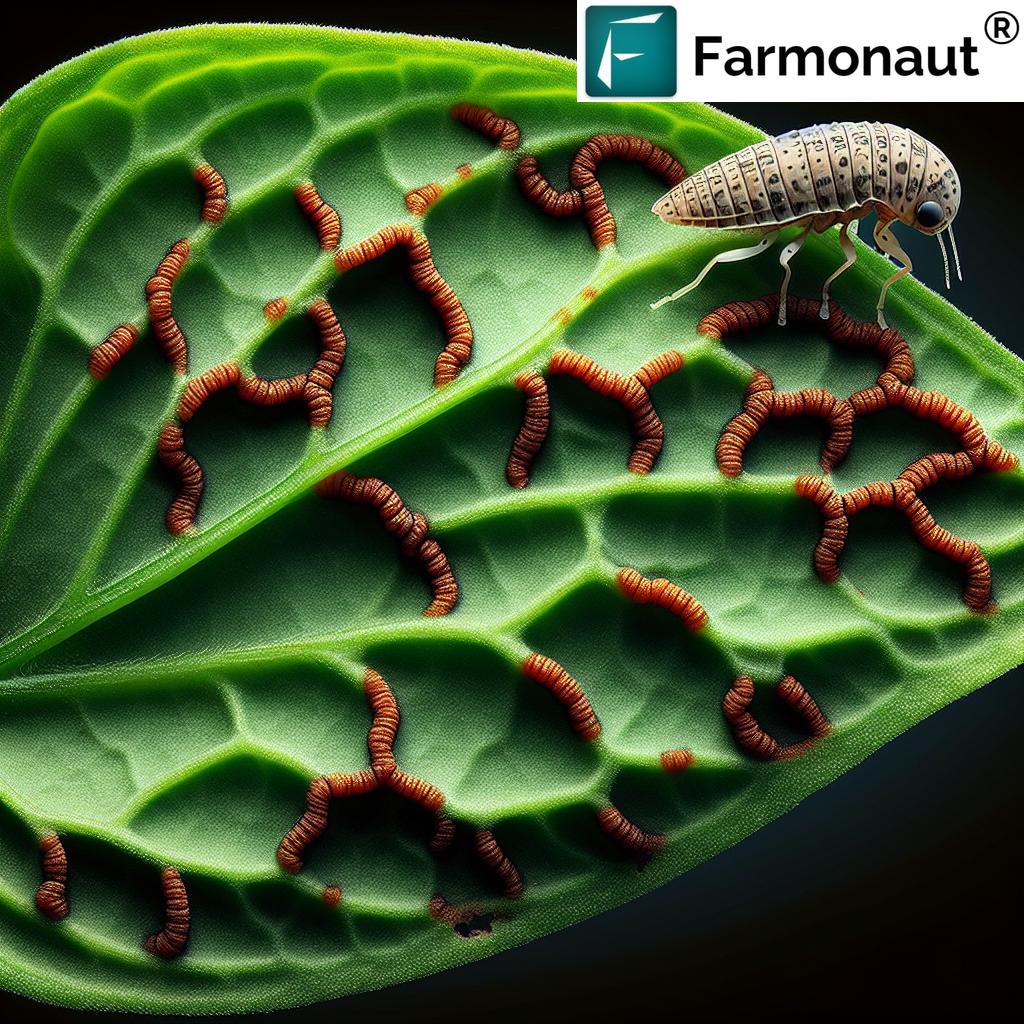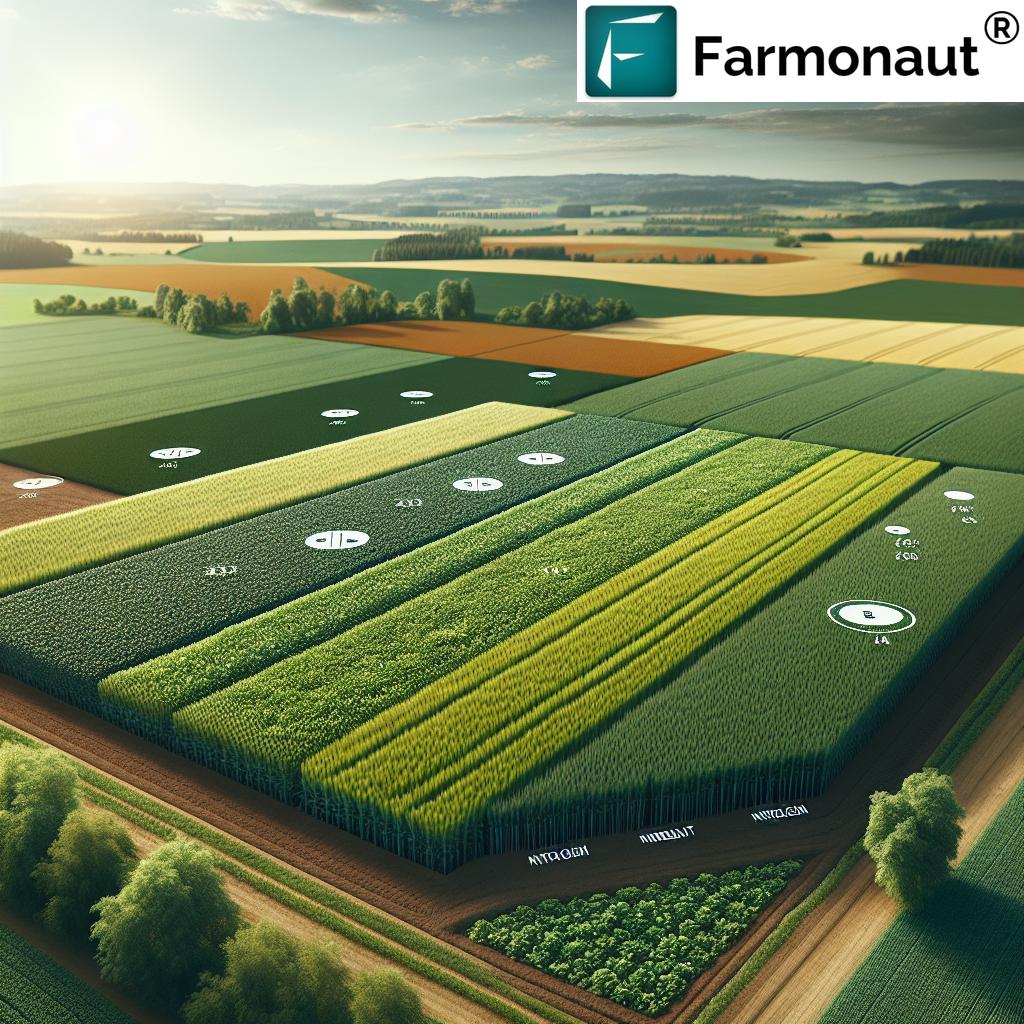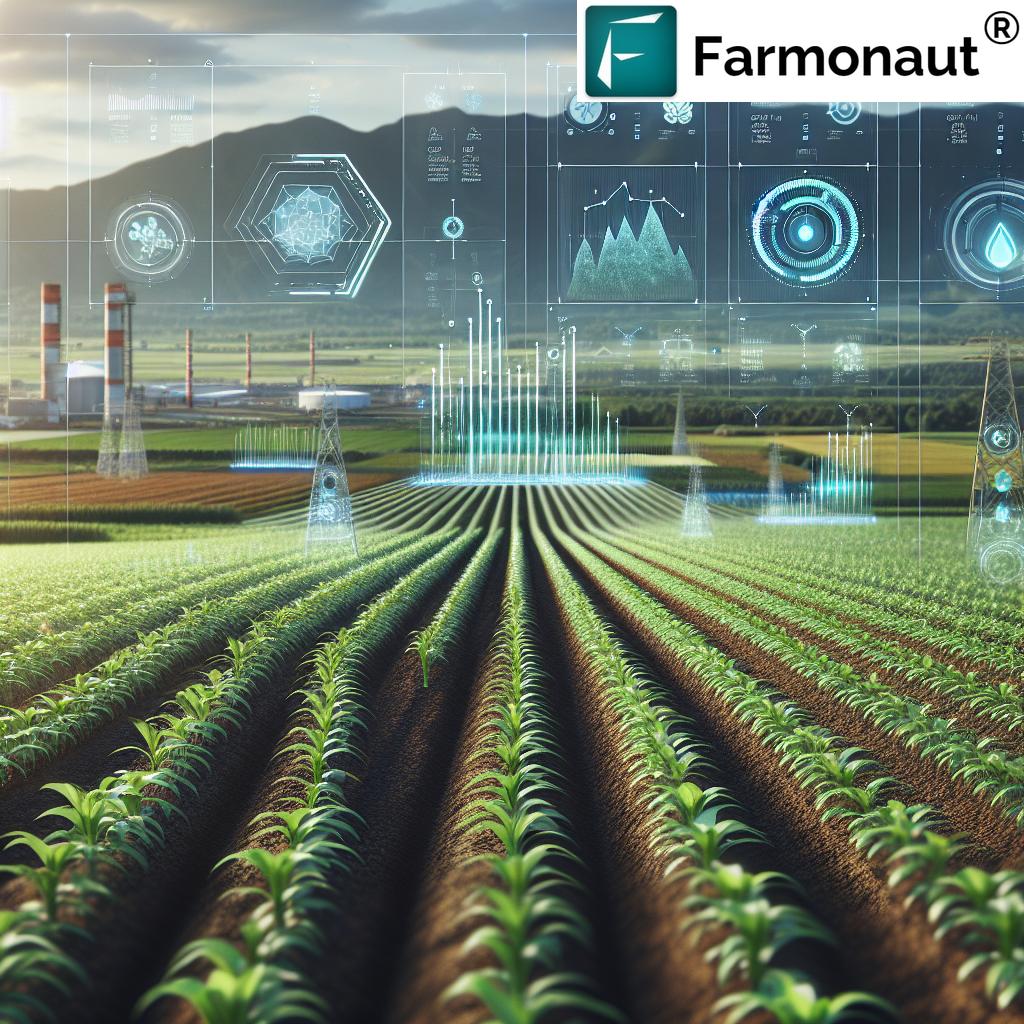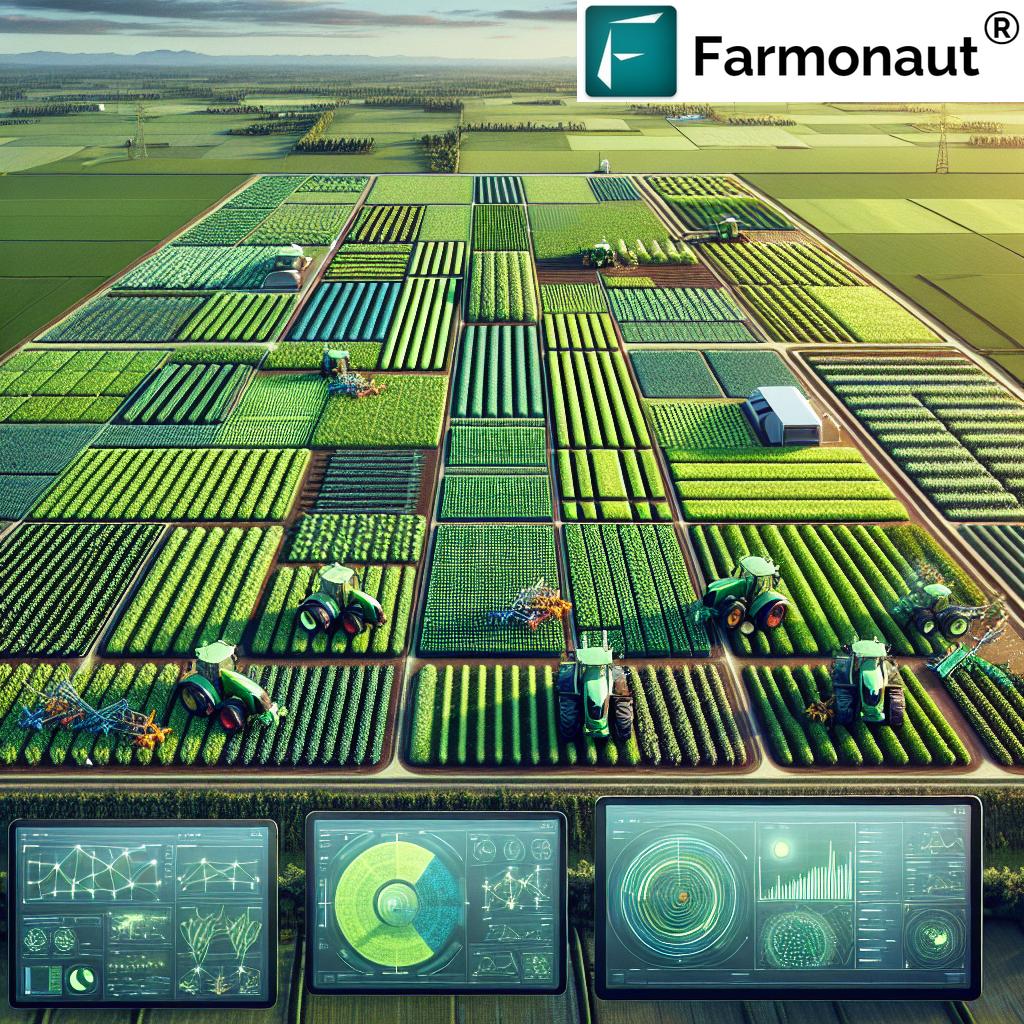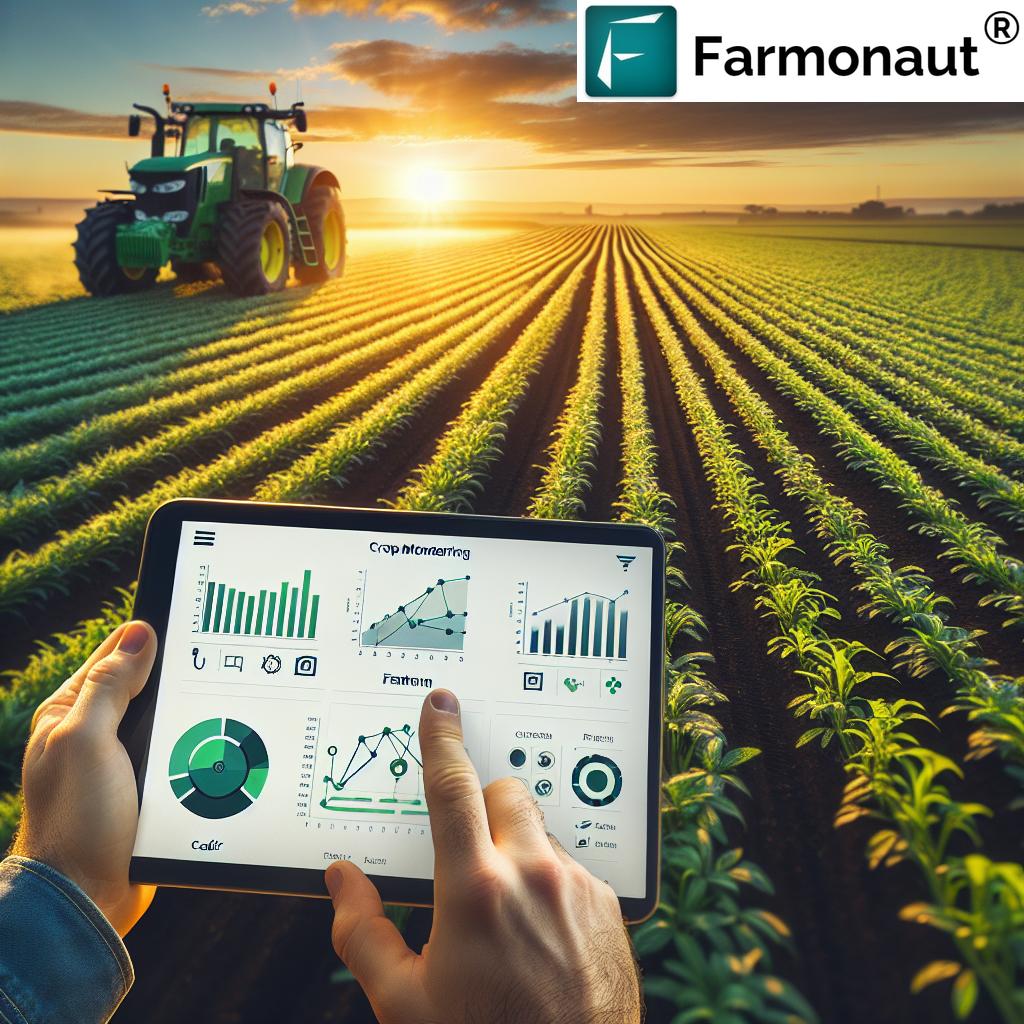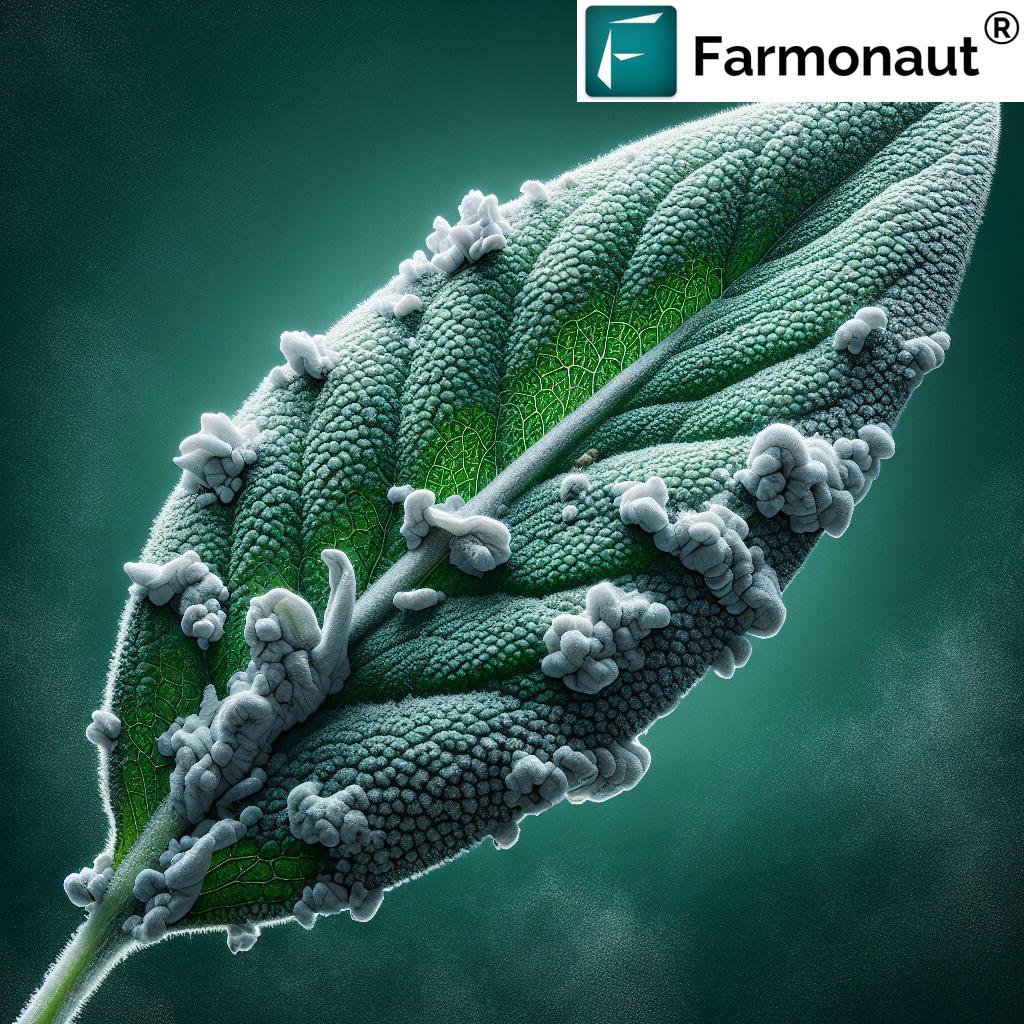Revolutionizing Agriculture: How AI and IoT Are Transforming Sustainable Farming Practices
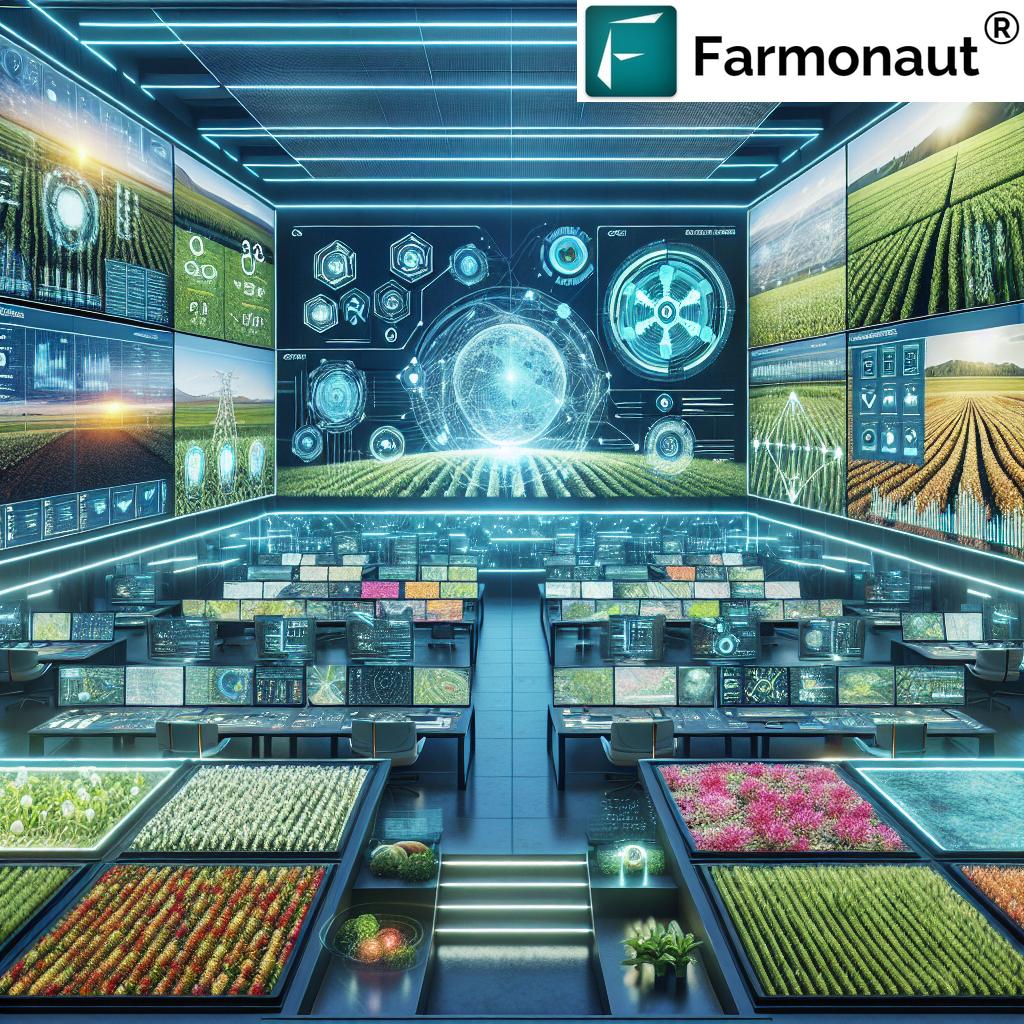
“AI-powered precision agriculture techniques can increase crop yields by up to 30% while reducing water usage by 20-50%”
In today’s rapidly evolving world, the agricultural sector faces unprecedented challenges. With a growing global population and increasing food demand, the need for sustainable and efficient farming practices has never been more critical. At Farmonaut, we’re at the forefront of this agricultural revolution, harnessing the power of digital agriculture solutions and smart farming technologies to transform the landscape of modern farming.
As we delve into the world of AI in agriculture and IoT for crop monitoring, we’ll explore how these innovative technologies are not just changing the way we farm, but are essential in ensuring food security for future generations. From precision agriculture techniques to advanced agribusiness data analytics, we’re witnessing a paradigm shift in how we approach farming – one that promises greater efficiency, sustainability, and productivity.
The Rise of Digital Agriculture Solutions
The agricultural sector is undergoing a significant transformation, driven by the adoption of digital agriculture solutions. These technologies are revolutionizing every aspect of farming, from planting to harvesting, and even supply chain management. Let’s explore some of the key components of this digital revolution:
- AI-Powered Decision Making: Artificial intelligence is becoming the backbone of modern farming. AI algorithms analyze vast amounts of data from various sources, including satellite imagery, weather patterns, and soil sensors, to provide farmers with actionable insights.
- IoT Devices for Real-Time Monitoring: The Internet of Things (IoT) has introduced a new era of connectivity in agriculture. Smart sensors placed throughout fields collect real-time data on soil moisture, nutrient levels, and crop health, enabling precise and timely interventions.
- Cloud-Based Platforms: Cloud computing allows for the storage and processing of enormous amounts of agricultural data. This enables farmers to access critical information from anywhere, facilitating better decision-making and resource management.
- Remote Sensing Technologies: Satellite imagery and drone technology provide farmers with a bird’s-eye view of their fields, helping to identify issues early and optimize crop management strategies.
At Farmonaut, we integrate these technologies into our intelligent agriculture cloud, offering farmers a comprehensive suite of tools to enhance their farming practices. Our platform leverages advanced AI algorithms and IoT connectivity to provide real-time crop monitoring, pest detection, and yield estimation services.
Explore our cutting-edge agricultural solutions:
Precision Agriculture: The Future of Farming
Precision agriculture techniques are at the heart of the agricultural revolution. By utilizing advanced technologies, farmers can optimize their resources, reduce waste, and increase yields. Here’s how precision agriculture is changing the game:
- Site-Specific Management: Rather than treating fields uniformly, precision agriculture allows for targeted interventions based on specific needs of different areas within a field.
- Variable Rate Technology (VRT): This technology enables the precise application of inputs such as fertilizers, pesticides, and water, based on the specific requirements of different parts of the field.
- GPS-Guided Machinery: GPS-enabled tractors and harvesters can operate with centimeter-level accuracy, reducing overlap and improving efficiency.
- Crop Monitoring Systems: Advanced sensors and imaging technologies provide real-time data on crop health, allowing for early detection of issues and timely interventions.
Our Farmonaut platform integrates these precision agriculture techniques, offering farmers the tools they need to implement these advanced practices effectively. Through our satellite-based crop health monitoring system, farmers can access detailed insights into their fields’ conditions, enabling them to make data-driven decisions.
The Role of AI in Revolutionizing Agriculture
Artificial Intelligence is playing a pivotal role in transforming agricultural practices. From predictive analytics to autonomous farming equipment, AI is enhancing efficiency and sustainability across the agricultural value chain. Here are some key applications of AI in agriculture:
- Predictive Analytics: AI algorithms analyze historical data, weather patterns, and market trends to predict crop yields, optimize planting schedules, and forecast market demands.
- Automated Crop and Soil Monitoring: AI-powered image recognition systems can identify plant diseases, pest infestations, and nutrient deficiencies early, allowing for timely interventions.
- Smart Irrigation Systems: AI algorithms optimize water usage by analyzing soil moisture levels, weather forecasts, and crop water requirements.
- Robotic Harvesting: AI-driven robots can identify ripe produce and harvest it with precision, reducing labor costs and improving efficiency.
At Farmonaut, we’ve integrated AI into our core offerings, particularly in our Jeevn AI Advisory System. This system provides personalized, AI-driven advice to farmers, helping them make informed decisions about crop management, resource allocation, and risk mitigation.
Experience the power of AI in agriculture with our mobile apps:
IoT: Connecting the Agricultural Ecosystem
The Internet of Things (IoT) is creating a connected agricultural ecosystem, where data flows seamlessly between various devices and systems. This interconnectedness is enabling farmers to gain unprecedented insights into their operations and make data-driven decisions. Here’s how IoT is transforming agriculture:
- Smart Sensors: IoT sensors placed throughout fields collect real-time data on soil moisture, temperature, humidity, and other critical parameters.
- Connected Farm Equipment: IoT-enabled tractors, harvesters, and other machinery provide real-time data on their performance and operational efficiency.
- Livestock Monitoring: IoT devices can track animal health, behavior, and productivity, enabling early detection of issues and optimized herd management.
- Supply Chain Tracking: IoT sensors can monitor the condition of produce during transportation, ensuring quality and reducing waste.
Our Farmonaut platform leverages IoT technology to provide farmers with comprehensive, real-time insights into their operations. By integrating data from various IoT devices, we offer a holistic view of farm performance, enabling more efficient and sustainable farming practices.
“AI in agriculture is projected to grow at a CAGR of 25.5% from 2020 to 2026, reaching $4 billion.”
Sustainable Farming Practices Through Technology
As the global population continues to grow, the need for sustainable farming practices becomes increasingly critical. Technology is playing a vital role in making agriculture more sustainable by optimizing resource use and reducing environmental impact. Here’s how technology is promoting sustainability in farming:
- Precision Resource Management: AI and IoT technologies enable precise application of water, fertilizers, and pesticides, reducing waste and environmental impact.
- Carbon Footprint Reduction: Smart farming practices can significantly reduce greenhouse gas emissions by optimizing fuel use and improving soil health.
- Biodiversity Conservation: Advanced monitoring systems help farmers protect and enhance biodiversity on their lands.
- Water Conservation: Smart irrigation systems and drought-resistant crop varieties, developed through AI-assisted breeding, help conserve water resources.
At Farmonaut, sustainability is at the core of our mission. Our platform includes features like carbon footprint tracking, which helps agribusinesses monitor and reduce their environmental impact. By providing real-time data on emissions, we enable farmers to take concrete steps towards more sustainable practices.
Agribusiness Data Analytics: Driving Informed Decisions
In the era of big data, agribusiness data analytics has become a crucial tool for farmers and agricultural businesses. By harnessing the power of data, we can unlock new insights and drive more informed decision-making across the agricultural value chain. Here’s how data analytics is transforming agribusiness:
- Yield Prediction: Advanced analytics models can predict crop yields with increasing accuracy, helping farmers and agribusinesses plan more effectively.
- Market Intelligence: Data analytics provides insights into market trends, helping farmers make informed decisions about what crops to grow and when to sell.
- Risk Management: By analyzing historical data and current conditions, analytics tools can help identify and mitigate various risks, from weather-related issues to market fluctuations.
- Supply Chain Optimization: Data analytics enables more efficient supply chain management, reducing waste and improving profitability.
Our Farmonaut platform integrates powerful data analytics capabilities, providing farmers and agribusinesses with actionable insights derived from multiple data sources. From satellite imagery to weather data and historical yield information, we help our users make data-driven decisions that boost productivity and profitability.
Leverage our API for advanced agricultural data analytics:
Overcoming Adoption Challenges in Digital Agriculture
While the benefits of digital agriculture solutions are clear, adoption rates remain relatively low in many parts of the world. Several challenges hinder the widespread adoption of these technologies:
- Initial Investment Costs: Many farmers, especially smallholders, find it challenging to invest in new technologies due to high upfront costs.
- Technical Knowledge Gap: The complexity of some digital agriculture solutions can be intimidating for farmers who may lack technical expertise.
- Infrastructure Limitations: In many rural areas, limited internet connectivity and unreliable power supply can hinder the implementation of IoT and cloud-based solutions.
- Data Privacy Concerns: Farmers may be hesitant to share their data due to concerns about privacy and data ownership.
At Farmonaut, we’re committed to addressing these challenges and making digital agriculture solutions accessible to farmers of all scales. Our platform is designed with user-friendliness in mind, and we offer flexible pricing options to accommodate different farm sizes and budgets. We also prioritize data security and transparency, ensuring that farmers retain control over their valuable information.
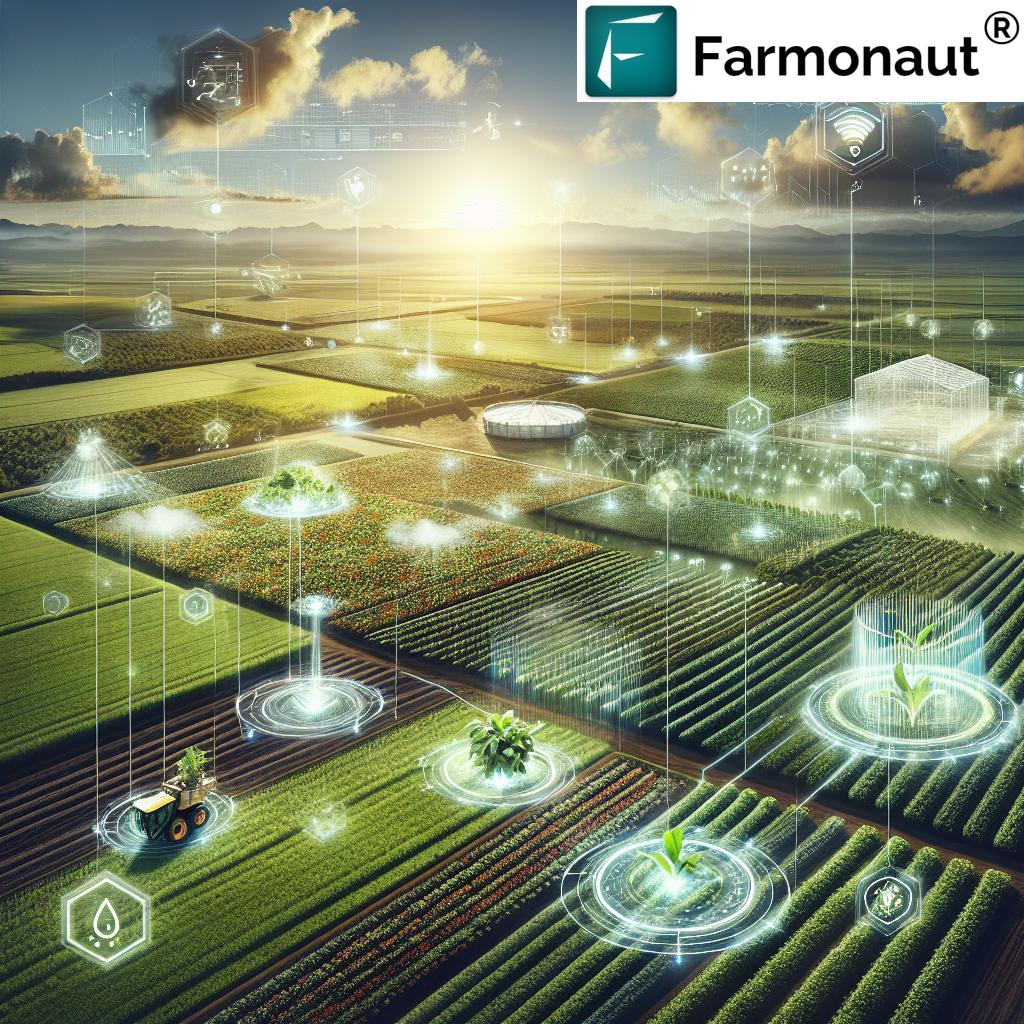
The Future of Farming: Integrating AI, IoT, and Sustainability
As we look to the future, it’s clear that the integration of AI, IoT, and sustainable practices will continue to shape the agricultural landscape. Here are some trends we anticipate will drive the future of farming:
- Autonomous Farming: AI-driven autonomous tractors and drones will become more prevalent, reducing labor costs and improving efficiency.
- Vertical and Urban Farming: AI and IoT will enable the growth of vertical and urban farming initiatives, bringing food production closer to consumers.
- Blockchain in Agriculture: Blockchain technology will enhance traceability and transparency in the agricultural supply chain.
- Personalized Crop Varieties: AI-assisted breeding programs will develop crop varieties tailored to specific local conditions and climate change scenarios.
At Farmonaut, we’re continuously innovating to stay ahead of these trends. Our research and development efforts focus on integrating cutting-edge technologies to provide farmers with the tools they need to thrive in the evolving agricultural landscape.
Comparative Analysis: AI and IoT Applications in Sustainable Agriculture
| Application | Technology Used | Benefits | Adoption Rate (%) |
|---|---|---|---|
| Crop Monitoring | Satellite imagery, Drones, AI | Early disease detection, Optimized resource use | 35 |
| Precision Irrigation | IoT sensors, AI algorithms | Water conservation, Improved crop health | 28 |
| Pest Detection | AI image recognition, IoT traps | Reduced pesticide use, Higher crop quality | 22 |
| Yield Estimation | Machine learning, Satellite data | Accurate forecasting, Better market planning | 30 |
| Supply Chain Management | Blockchain, IoT sensors | Enhanced traceability, Reduced waste | 18 |
Farmonaut: Empowering Farmers with Cutting-Edge Technology
At Farmonaut, we’re committed to making advanced agricultural technologies accessible to farmers worldwide. Our platform integrates satellite-based crop health monitoring, AI-driven advisory systems, and blockchain-based traceability solutions to address the diverse needs of modern agriculture. Here’s how we’re making a difference:
- Real-Time Crop Monitoring: Our satellite-based monitoring system provides farmers with up-to-date information on crop health, helping them identify and address issues promptly.
- AI-Powered Insights: The Jeevn AI Advisory System offers personalized recommendations based on real-time data and advanced analytics.
- Blockchain Traceability: We enable transparent and secure supply chains, enhancing trust between producers and consumers.
- Resource Optimization: Our tools help farmers manage their resources more efficiently, reducing waste and improving sustainability.
By leveraging these technologies, we’re helping farmers increase their productivity, reduce their environmental impact, and adapt to the challenges of modern agriculture.
Conclusion: Embracing the Agricultural Revolution
As we’ve explored throughout this blog post, AI and IoT are truly revolutionizing agriculture, paving the way for more sustainable, efficient, and productive farming practices. From precision agriculture techniques to advanced data analytics, these technologies are helping farmers meet the growing global demand for food while minimizing environmental impact.
At Farmonaut, we’re proud to be at the forefront of this agricultural revolution. Our platform combines the power of satellite technology, AI, and blockchain to provide farmers with the tools they need to thrive in this new era of farming. As we look to the future, we remain committed to innovation, sustainability, and empowering farmers worldwide.
The journey towards a smarter, more sustainable agricultural landscape has only just begun. By embracing these technologies and continuing to innovate, we can ensure a food-secure future for generations to come.
FAQs
- What is precision agriculture?
Precision agriculture is a farming management concept that uses technology to observe, measure, and respond to variability in crops. It aims to optimize returns on inputs while preserving resources. - How does AI benefit agriculture?
AI in agriculture helps in crop monitoring, pest detection, yield prediction, and resource optimization. It enables data-driven decision-making, improving efficiency and productivity. - What role does IoT play in sustainable farming?
IoT devices collect real-time data on various agricultural parameters, enabling precise resource management and early detection of issues, thus promoting sustainable farming practices. - How does Farmonaut’s platform work?
Farmonaut’s platform uses satellite imagery, AI, and blockchain to provide real-time crop monitoring, personalized advisory services, and supply chain traceability solutions. - Is digital agriculture suitable for small-scale farmers?
Yes, digital agriculture solutions like Farmonaut are designed to be accessible and beneficial for farmers of all scales, including smallholders.






